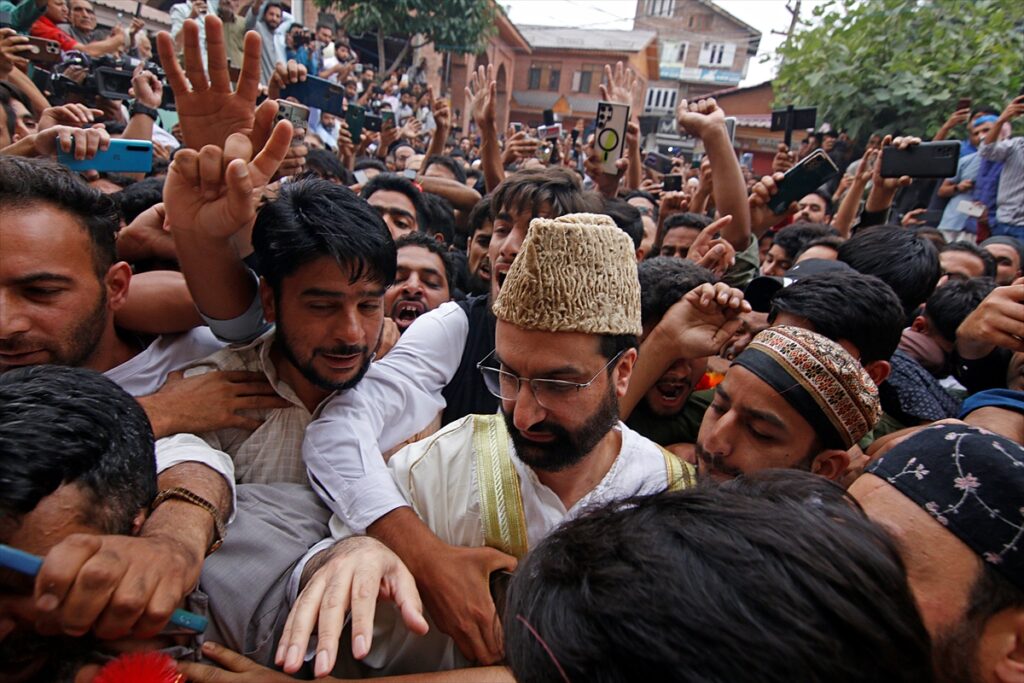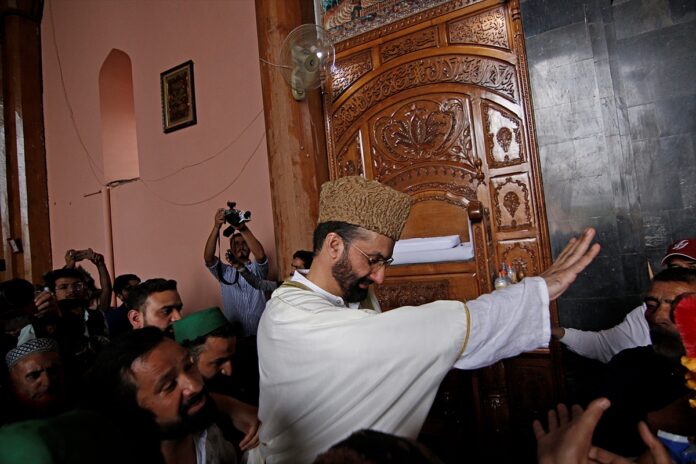The Kashmiri separatist religious leader, Mirwaiz Umar Farooq, has been released by the Indian authorities after four years of house detention.
Addressing an emotionally-charged gathering at Jamia Masjid in Srinagar yesterday, Farooq said the four years he spent in house detention were the worst period of his life after the assassination of his father, Mirwaiz Molvi Muhammad Farooq, in 1990.
But amid heavy security around the mosque, he said the dispute with India should be resolved through dialogue.
Jammu and Kashmir may “be a territorial dispute for many, but it is a humanitarian issue craving resolution through dialogue,” he told worshippers.
“People are aware that after August 4, 2019, I was kept under house detention and I was not allowed to move out of my home, due to which I was unable to perform my duties as Mirwaiz,” said Farooq.
“The Hurriyat Conference continued to raise its voice, but the media stopped using our statements. I want to tell my people that it is the time to be patient, to have faith in the Almighty.”
Mirwaiz Umar Farooq was arrested a day before India’s Hindu nationalist government stripped Indian-administered Kashmir of its limited autonomy and divided the region into two federally-governed territories.
Subscribe to our newsletter and stay updated on the latest news and updates from around the Muslim world!
The August 5, 2019 move was followed by an unprecedented security clampdown and arrest of thousands of people, including pro-India politicians, top separatist leaders, lawyers and common Kashmiris to preempt popular demonstrations against New Delhi’s move.
The separatist leader demanded the release of the Kashmiris imprisoned during the 2019 crackdown. “Thousands are in jail including traders, journalists and human rights activists. We want to see them free.”
Nevertheless, he said that Indian Prime Minister Narender Modi is right in saying, in the context of Ukraine, that the present era is not an era of war.
“We too have been advocating for the resolution of the J&K issue through dialogue. Following the path of peace, we had to bear difficulties, but unfortunately, we were branded as anti-peace. But we don’t have any personal ambition, we only want peaceful resolution of J&K issue,” he said.

Earlier, dozens of people broke down when he ascended the pulpit of the medieval Jamia Masjid in Srinagar to deliver his first Friday sermon as a free man. The 50-year-old Farooq also sobbed as he stood up on the pulpit.
Scores of people lined up at the mosque’s entrance to greet him with garlands. Women and men tossed almonds and candy at Mirwaiz while shouting pro-Islam and pro-Mirwaiz slogans.
The Jamia mosque has been central to Kashmir’s politics and which has the largest gatherings on Fridays and other important Muslims’ religious occasions like Eid and Lailat-ul-Qadr.
Since the Mirwaiz was also the chairman of a faction of All Parties Hurriyat Conference, a conglomeration of several smaller pro-freedom parties, the mosque had, by default, become an important centre for pro-freedom politics.
The nearby Nowhatta neighborhood was the epicentre of Friday protests that often turned into clashes between stone-throwing pro-freedom protesters and police.
However, since Aug. 5, 2019, when the Hindu nationalist Indian government scrapped the region’s autonomy, no Friday or other important prayers, have been allowed at the mosque.
Before and after Aug. 5, 2019, tens of hundreds of people, including nearly the entire pro-freedom leadership, were jailed. Although Mirwaiz was spared jail, he has been under house detention for the most extended period, only behind the deceased Syed Ali Geelani, the 89-year-old Hurriyat leader who died in house detention in Sept. 2021.
Mirwaiz’s release came days after the government released Moulana Mushtaq Veeri and Moulana Dawoodi, two prominent religious leaders, from detention under the draconian Public Safety Act, which allows for detention without trial for up to six months.
The Himalayan region of Kashmir has been divided between India and Pakistan since their independence from British rule in 1947.
Both the South Asian nuclear powers claim the region in its entirety but control parts of it. They have fought two of their three full-scale wars over the Kashmir issue as bilateral ties remain frozen since 2019.
Mirwaiz demanded a peaceful solution to the Kashmir issue to end the suffering of the people of Kashmir.
SOURCE: AA and 5PILLARS























